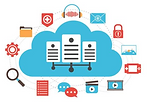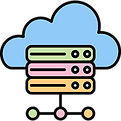
Cloud Engineering
Cloud Services and integration
Our cloud computing expertise are in fields like artificial intelligence, machine learning models, IoT, and remote work environments.
We have done projects in domain such as health-care, office-assistance and human-resources using LLMs, Natural Language Processing (NLPs) models. We have built neural networks for field application in IoT.



Cloud service providers
We have experience of working with multiple cloud services providers. Thereby, we are in unique position to compare service offerings. For example, how to leverage GPU infrastructure in dedicated compute environment versus using it as managed-service.
Similarly, we can help you determine how and where to host servers like Apache, NGINX, SMTP.
We have worked extensively with cloud providers like AWS, GCP, Digital Ocean, Azure, RunPod.
Cloud Services
Few of the cloud services give complete autonomy of configuration and deployment. Here our teams are in control of how a cloud service will be used and who will be the users. For example, EC2 and S3. At the same time, it is easy to integrate multimedia service like Kinesis Video service or IoT-core with EC2 as compute and S3 or RDS as storage.
Cloud Integration
It is at most important to establish traceability of work items from Jira to Github to Jenkins to cloud deployments. All of projects have such tracking by default. It helps us to generate metrics and identify improvement areas.
Some of the key features of major CSPs integrated by ATRI
1. Amazon Web Services (AWS)
AWS is one of the leading cloud service providers, offering a wide range of cloud computing services, including storage, databases, machine learning, and Internet of Things (IoT). Some key features of AWS cloud integration services include:
-
AWS Lambda – Serverless computing for event-driven applications.
-
Amazon API Gateway – Fully managed API service for creating, deploying, and managing APIs.
-
AWS Step Functions – Workflow orchestration for microservices.
-
Amazon S3 & Amazon RDS – Scalable storage and relational database management.
-
AWS Direct Connect – Dedicated network connection for secure cloud integration.
-
AWS AI and ML Services: Amazon SageMaker for building, training, and deploying machine learning models; AWS Deep Learning AMIs for AI development; Amazon Rekognition for image and video analysis.
-
AWS IoT Services: AWS IoT Core for secure device connectivity, AWS IoT Greengrass for local compute, and AWS IoT Analytics for advanced data analysis.
AWS provides flexibility, scalability, and robust security features, making it an excellent choice for enterprises seeking seamless cloud integration.
2. Microsoft Azure
Microsoft Azure is another top cloud computing platform offering a comprehensive suite of cloud integration tools. Azure provides seamless hybrid cloud capabilities, making it ideal for businesses requiring a mix of on-premises and cloud-based solutions. Some of the key features of Azure include:
-
Azure Logic Apps – Automates workflows and connects cloud and on-premises applications.
-
Azure API Management – Secure and manage APIs across multiple environments.
-
Azure Service Bus – Enterprise messaging for distributed applications.
-
Azure Functions – Serverless compute service for event-driven workloads.
-
Hybrid Capabilities – Seamless integration with Microsoft tools and services, such as Office 365, Dynamics 365, and SharePoint.
-
Azure AI and ML Services: Azure Machine Learning for AI model development, Cognitive Services for AI-powered APIs, and Azure Bot Services for intelligent chatbots.
-
Azure IoT Services: Azure IoT Hub for device management, Azure IoT Edge for on-device computing, and Azure Digital Twins for real-world system modeling.
Azure’s strong enterprise presence, security, and AI-driven analytics make it a powerful platform for cloud integration.
3. Google Cloud Platform (GCP)
Google Cloud is known for its cutting-edge AI and data analytics capabilities. It provides a scalable and secure infrastructure, offering various tools for cloud integration, including:
-
Cloud Functions – Event-driven serverless computing.
-
Cloud Pub/Sub – Real-time messaging service for event ingestion and delivery.
-
Apigee API Management – Comprehensive API lifecycle management.
-
BigQuery – Scalable and cost-effective data warehouse with real-time analytics.
-
Anthos – Hybrid and multi-cloud management platform.
-
GCP AI and ML Services: TensorFlow AI framework, AutoML for building machine learning models, and Vertex AI for end-to-end AI model development.
-
GCP IoT Services: Cloud IoT Core for secure device connection and management, and IoT Edge for local processing and AI inference.
GCP’s AI and machine learning expertise, along with strong API management tools, make it a preferred choice for businesses focusing on data-driven solutions.
4. IBM Cloud
IBM Cloud provides enterprise-grade cloud computing services with a strong emphasis on AI, security, and hybrid cloud solutions. Some of its key cloud integration services include:
-
IBM App Connect – Intelligent automation for integrating applications and data.
-
IBM API Connect – Full API lifecycle management.
-
IBM Watson AI Services – Advanced AI-driven insights and automation.
-
IBM Cloud Pak for Integration – End-to-end integration platform for connecting cloud and on-premises systems.
-
Hybrid Cloud Solutions – Secure and flexible multi-cloud management capabilities.
IBM Cloud is a strong choice for enterprises needing AI-powered analytics and hybrid cloud integration.
5. Oracle Cloud
Oracle Cloud specializes in enterprise cloud solutions with a focus on databases and business applications. It offers a range of integration tools, including:
-
Oracle Integration Cloud – Pre-built connectors for SaaS, on-premises, and third-party applications.
-
Oracle API Gateway – Secure API management for distributed systems.
-
Oracle Cloud Infrastructure (OCI) – High-performance computing and storage services.
-
Oracle Data Integration Platform Cloud – Comprehensive data integration and transformation.
-
Autonomous Database – Self-driving, self-securing, and self-repairing database services.
Oracle Cloud is well-suited for organizations that rely on Oracle’s enterprise applications and require robust data integration capabilities.
6. DigitalOcean Cloud
DigitalOcean is a cloud service provider known for its simplicity, developer-friendly tools, and cost-effective solutions. Some of the key features include:
-
Droplets – Scalable and customizable virtual machines.
-
Managed Kubernetes – Simplified Kubernetes deployment and management.
-
Spaces Object Storage – Secure and scalable cloud storage.
-
Databases – Managed databases including PostgreSQL, MySQL, and Redis.
-
App Platform – Fully managed platform for deploying applications.
-
API and CLI Support – Developer-friendly integration tools.
DigitalOcean is ideal for startups, developers, and small to medium-sized businesses looking for an easy-to-use and affordable cloud platform.
%20(1).png)